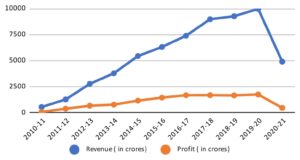Shravan M K discusses how the pandemic has affected the sale of lottery tickets in Kerala, and consequently, the livelihoods of lottery ticket sellers, many of who are elderly, women, or persons with disabilities.
Shravan M K
‘Tomorrow, tomorrow, tomorrow!’
Lottery ticket sellers chanting about the promise of tomorrow’s wins have become a ubiquitous part of Kerala’s streets. But now, with the state-wide lockdown during the pandemic, Kerala’s 2,00,000 ticket sellers, many of who are elderly, or persons with disabilities, have been plunged into an uncertain future. Social distancing in public spaces, and masked people who fear contracting the virus through contact have silenced the voices chanting ‘tomorrow, tomorrow, tomorrow’ to attract buyers.

Why Does the Revenue from Lottery Receipts Matter?
With a motto vishwastham, sutharyam, janakeeyam (reliable, transparent, and popular), the Kerala State Lotteries Department has never failed to reap success since its inception. Apart from the supernormal profits to the government, selling lottery tickets is a source of livelihood for many hapless, old and disabled people. Unlike other states, Kerala runs its own lottery programme which enables the government to reallocate a portion of the revenue to welfare schemes. The revenue from the Karunya lottery funds the medical bills of lower-income people affected with ailments like haemophilia, kidney diseases, etc. In addition, Stree Shakthi and Nirmal lotteries contribute to the welfare needs of women, like installing ‘she toilets’. But the onset of the COVID-19 pandemic has had a debilitating effect on the sale of lotteries, as seen in the chart below. Alternative sources of income should be explored to meet the immediate needs of our economy and supplement revenue gain from lotteries, aimed at absorbing the educated unemployed youth of Kerala and reviving tourism.

In the last few years, factors like repeated floods and the inclusion of lottery under GST in 2018 (with a tax slab of 12% for state-run lotteries and 28% for state-authorised lotteries) have stagnated profits from lottery ticket sales. From an economic perspective, a ‘good’ is something that satisfies human wants. Here, actionable claims like gambling and lotteries serve the same function of an economic good, so the usual norms of GST are applicable.
According to Ambili, a woman lottery agent from Payyoli in Kozhikode, the unforeseeable future created by the pandemic has shattered her hopes. All her meagre savings so far got exhausted because of this crisis, and now, with an empty pocket, she is working to earn enough for subsistence. She added that even though sales resumed a few weeks back, only 3 lotteries—Win-Win, Akshaya, and Nirmal—are selling these days. Having worked as a lottery agent for nearly 13 years, she is unable to switch to any other job. Earlier, around 42 sellers would collect tickets from this agency, but now it has been reduced to 27 persons. The main reason for this decline, she says, was the fact that most lottery ticket sellers were aged persons who were at higher risk during the pandemic. She hopes that her business will be back to normal soon.
Challenges and The Way Forward
It is important to note that the main consumers of lotteries are risk-loving lower-income households who overestimate the small probabilities in any economic decision-making. Consequently, their expectations of future income while buying lottery tickets are high, and they tend to spend more on lotteries despite meagre incomes. This is how this gamble attracts vast sections of society. Many of them even partake in lotteries to build a home, or to secure the future of their children. This trend of participating in lotteries had been increasing enormously before the onset of the pandemic. But this pandemic created a similar situation to that of the Great Depression in the 1930s. Lack of income among individuals forced them not to spend their money on any extra benefits. Rationed food kits have helped many lower-income households meet their daily consumption needs. Demographically, 20% of Kerala’s total population comprises elderly persons over 60 years of age. Their concerns can be addressed only through improving existing welfare schemes. Given that a significant proportion of lower-income aged persons sell lottery tickets for a living, the pandemic-induced withdrawal from ticket-selling will have debilitating effects. Moreover, the unaddressed mental health issues of old-age people due to the uncertainty of their future, risk of infection, and home isolation made the situation worse.
To meet their needs, the government should grant direct cash transfers to needy persons and mark up the commission rates of agents determined by the Kerala State Lottery Agents and Lottery Sellers Welfare Fund Board. Further, skill training for women can widen their opportunities rather than make them fully dependent on lottery ticket sales for income. For the revival of our economy in the short run, vaccination is an important factor for ensuring healthy and productive labour. Vaccination has been made mandatory for opening shops or any enterprises. Grassroots-level participation and planning must be utilised to vaccinate those like lottery agents and sellers. Utilising digital platforms to improve lottery revenues is also one way forward.
About the author: Shravan M.K. is currently pursuing a Masters in Economics from Jawaharlal Nehru University (JNU), New Delhi. His research interests include development economics, macroeconomic policy analysis and political economy. He can be reached at shravanmk2211@gmail.com.

One comment